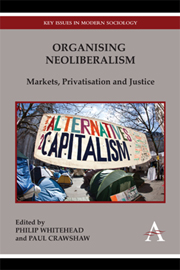Book contents
- Frontmatter
- Contents
- Chapter 1 Introduction: A Preliminary Mapping of the Terrain
- Chapter 2 Neoliberalism and Crime in the United States and the United Kingdom
- Chapter 3 Neoliberalism, Prisons and Probation in the United States and England and Wales
- Chapter 4 The Neoliberal Wings of the ‘Smoke-Breathing Dragon’: The Cigarette Counterfeiting Business and Economic Development in the People's Republic of China
- Chapter 5 A Neoliberal Security Complex?
- Chapter 6 The Influence of Neoliberalism on the Development of the English Youth Justice System under New Labour
- Chapter 7 Institutionalising Commercialism? The Case of Social Marketing for Health in the United Kingdom
- Chapter 8 Neoliberal Policy, Quality and Inequality in Undergraduate Degrees
- Chapter 9 Religion and Criminal Justice in Canada, England and Wales: Community Chaplaincy and Resistance to the Surging Tide of Neoliberal Orthodoxy
- Chapter 10 Markets, Privatisation and Justice: Some Critical Reflections
- Notes on Contributors
- Index
Chapter 8 - Neoliberal Policy, Quality and Inequality in Undergraduate Degrees
Published online by Cambridge University Press: 05 February 2013
- Frontmatter
- Contents
- Chapter 1 Introduction: A Preliminary Mapping of the Terrain
- Chapter 2 Neoliberalism and Crime in the United States and the United Kingdom
- Chapter 3 Neoliberalism, Prisons and Probation in the United States and England and Wales
- Chapter 4 The Neoliberal Wings of the ‘Smoke-Breathing Dragon’: The Cigarette Counterfeiting Business and Economic Development in the People's Republic of China
- Chapter 5 A Neoliberal Security Complex?
- Chapter 6 The Influence of Neoliberalism on the Development of the English Youth Justice System under New Labour
- Chapter 7 Institutionalising Commercialism? The Case of Social Marketing for Health in the United Kingdom
- Chapter 8 Neoliberal Policy, Quality and Inequality in Undergraduate Degrees
- Chapter 9 Religion and Criminal Justice in Canada, England and Wales: Community Chaplaincy and Resistance to the Surging Tide of Neoliberal Orthodoxy
- Chapter 10 Markets, Privatisation and Justice: Some Critical Reflections
- Notes on Contributors
- Index
Summary
Introduction
In this chapter we analyse two contradictory framings of “a high-quality undergraduate education’ and reveal how neoliberal higher education policy is in danger of increasing inequality in England. The first framing, which is found in policy documents, sees the marketisation of the higher education system as essential to high quality. It views student employment as the key measure of high quality and suggests that disadvantaged students would prefer to pursue degrees that focus on employment training rather than study academic disciplines. The English university system is class-divided and most disadvantaged students, along with members of the lower middle class, attend lower-ranking universities (Roberts 2009). The policy documents definition of high quality has implications for curricula in these universities. The second framing is in current social science students’ accounts of what they value about the education they are receiving. These students, who are from diverse backgrounds and are based in higher- and lower-ranking universities in England, value the ways that engaging with disciplinary knowledge transforms them personally, empowers them socially and prepares them for employment.
Basil Bernstein's (2000) term “pedagogic rights’ provides a definition of “a high-quality undergraduate education’ that helps us evaluate these two very different perspectives. “Pedagogic rights’ signifies what higher education should contribute to democratic societies. Two elements of “pedagogic rights’ (enhancement and inclusion) map what students say they gain from studying social science at four universities which have been given pseudonyms to protect the identity of departments and students (see section on methodology).
- Type
- Chapter
- Information
- Organising NeoliberalismMarkets, Privatisation and Justice, pp. 179 - 200Publisher: Anthem PressPrint publication year: 2012
- 11
- Cited by



